Cucumbers are one of the most refreshing fruits that grow during summer. If you are growing them this upcoming season, it is essential to plan and provide the nourishment it needs to secure a bountiful harvest.
The best fertilizers for cucumbers are almost the same as the fertilizers used for carrots and tomatoes.
The ideal fertilizers for cucumbers must be high in potassium and phosphorus. They have low nitrogen requirements to focus on helping the plant produce more flowers and boost fruit production.
Nitrogen is a nutrient that promotes the growth of stems and leaves, and excessive nitrogen in cucumber plants can lead you to a fruitless summer.
In this post, we listed all the best fertilizers with a great combination of nutrients for the healthy growth of your cucumber plants. We included.
(You could use the table of contents below to jump to the sections that are most important to you.)
10 Best Fertilizers For Cucumbers – Reviews & Top Picks in 2023
Before you head on to the best plant foods for your cucumbers, let us guide you through the basics of fertilizer analysis.
Chances are, you have encountered numbers like 10-10-10 when searching for fertilizers. These three numbers stand for nitrogen(N), phosphorus(P), and potassium(K) or NPK, respectively,
The NPK ratio indicated in every fertilizer is the estimated minimum amount of nutrients in their formula.
Companies do not disclose the actual fertilizer ratio to prevent their competitors from copying their secret formula.
That’s why aside from the NPK ratio, it is essential to look at the extra contents included in fertilizers.
Now that you know about the NPK ratio, let’s head on to our list of best fertilizers for cucumbers:
1. Espoma Garden-Tone Plant Food
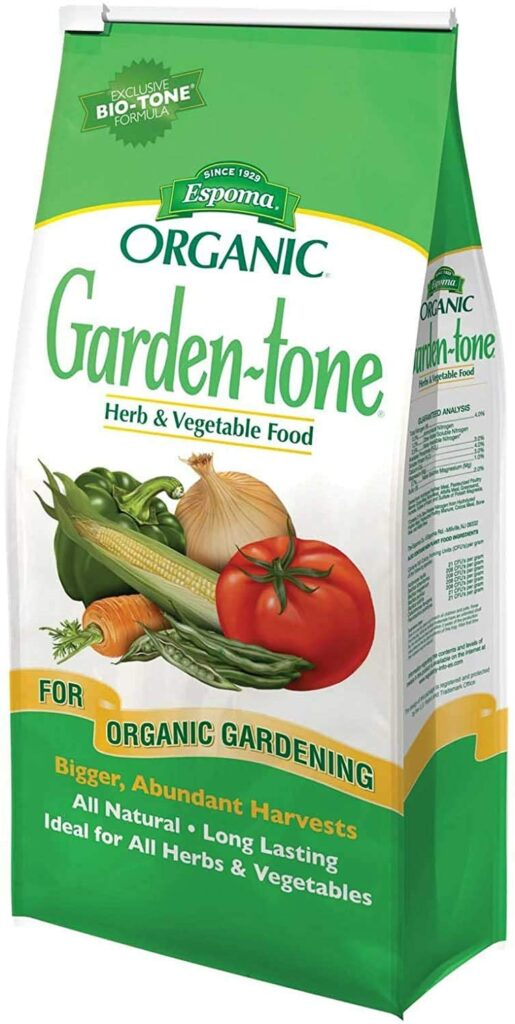
First on our list is one of the well-loved organic fertilizers in the market, Espoma Garden Tone is slow-release plant food formulated to boost fruit and vegetable production, as well as herbs. Espoma is popular among organic gardeners for its performance and affordability.
This fertilizer is formulated with 15 essential nutrients and fortified with Bio-tone technology to enhance the environment for beneficial microbes and microorganisms in the soil.
The manufacturer claims it has no fillers or sludges and is purely made from organic materials. It is derived from:
- Feather meal
- Poultry manure
- Bone meal
- Alfalfa meal
- Greensand
- Sulfate of Potash
Espoma Garden-Tone also has some added nutrients like 5% calcium, 1% magnesium, and 1% humic acid.
Magnesium is a vital component of chlorophyll and contributes to photosynthesis in plants. Calcium, on the other hand, helps improve plant cell formation for optimal plant growth.
Garden Tone is a 3-4-4 NPK fertilizer that helps consistently feed your plants for the whole month. You can also use it as part of your soil preparation and add it to the soil when transplanting seedlings.
This fertilizer is usually placed at the drip line placed approximately 2 to 3 inches from the stem where the absorbing roots are located. It is suitable for feeding the following varieties of plants:
Hardy crops:
- Broccoli
- Brussels sprouts
- Cabbage
- Collards
- English peas
- Kale
- Kohlrabi
- Leeks
- Mustard greens
- Parsley
- Radish
- Spinach
- Turnip
Semi-hardy crops (early spring or fall):
- Beets
- Carrot
- Cauliflower
- Celery
- Chinese cabbage
- Endive
- Irish potatoes
- Lettuce
- Radicchio
- Rutabaga
- Salsify
- Swiss chard
Summer crops:
- Beans
- Corn
- Cucumber
- Eggplant
- Melons
- Okra
- Peppers
- Pumpkins
- Summer squash
- Sweet potatoes
- Tomatoes
Since Garden-Tone is an organic fertilizer, it is safe to use around kids and pets. It also doesn’t pose any health risk to gardeners.
The only thing you have to deal with is its strong odor which is natural to organic fertilizers.
Due to its smell, some gardeners don’t recommend using this fertilizer for indoor plants.
Pros
- It is an organic fertilizer.
- It contains extra nutrients and Bio-tone technology.
- It is environment-friendly.
- It is safe to use around kids and pets.
- It can be used on a wide variety of plants.
- It has no fillers or sludges.
Cons
- It has a strong odor and may not be suitable to use indoors.
- Non-vegan (disadvantage for vegan gardeners)
2. MasterBlend Tomato & Vegetable Fertilizer
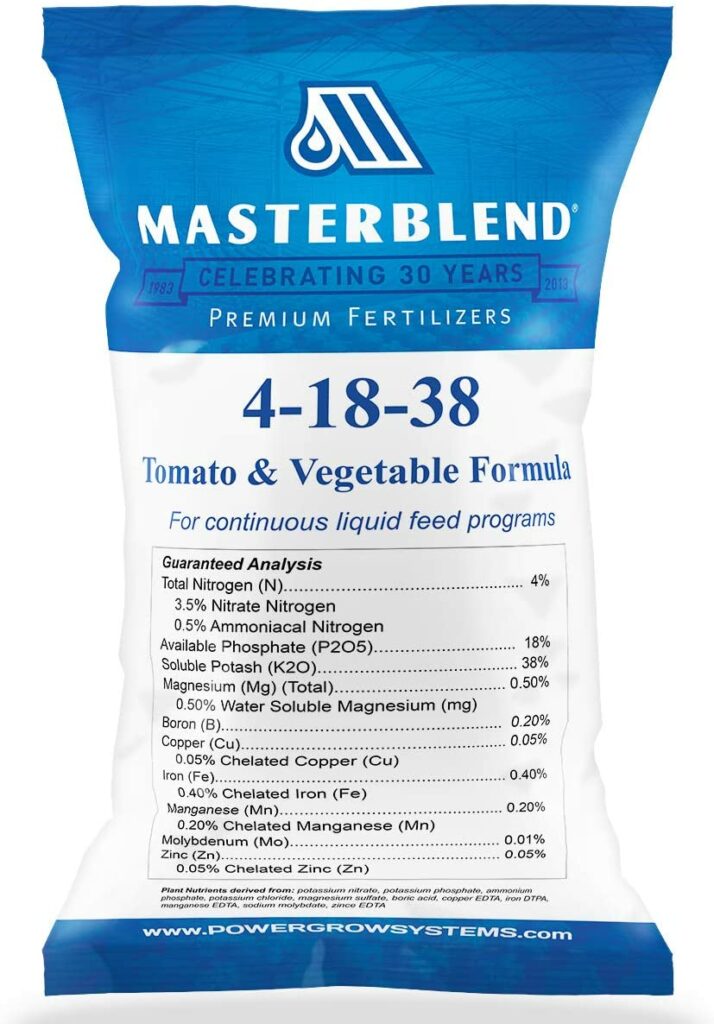
If you are growing cucumbers on a larger scale this season, MasterBlend will be just right for you.
MasterBlend Tomato & Vegetable Fertilizer is a synthetic fertilizer popularly used in commercial vegetable farms and has been known to help farmers produce more cucumbers every year.
This water-soluble fertilizer can be used on hydroponic and garden plants. It has a 4-18-38 NPK ratio which means it has the highest potassium content and nitrogen levels which is perfect for growing cucumbers.
It contains:
- Magnesium
- Boron
- Copper
- Iron
- Manganese
- Molybdenum
- Zinc
The only catch for this fertilizer is it needs to be mixed with Epsom salt and calcium nitrate for more balanced plant nutrition.
The manufacturer warns that the two additional ingredients should be mixed separately to the fertilizer to prevent any adverse chemical reaction that can lock up the nutrients from the fertilizer.
Most gardeners suggest mixing the Epsom salt first before applying the calcium nitrate.
While this mixing method is beneficial to plants, it can be a disadvantage to other gardeners.
If you are not fond of doing the extra work of mixing ingredients then this might not be the best one for you.
Due to its non-organic formulation, it may not be a kid and pet-friendly fertilizer. You may also need to wear safety gloves, a mask, and a long-sleeved shirt to avoid any risks of skin and eye irritation.
Pros
- It can be used as a hydroponic and garden fertilizer.
- It is commercially used for the high production of fruits and vegetables.
- The water-soluble formula ensures fast absorption of nutrients and immediate results.
Cons
- It’s a synthetic fertilizer.
- It needs additional ingredients for optimal performance.
- It’s not kid and pet-friendly.
3. Miracle-Gro Nature’s Care Organic & Natural Tomato, Vegetable & Herb Plant Food
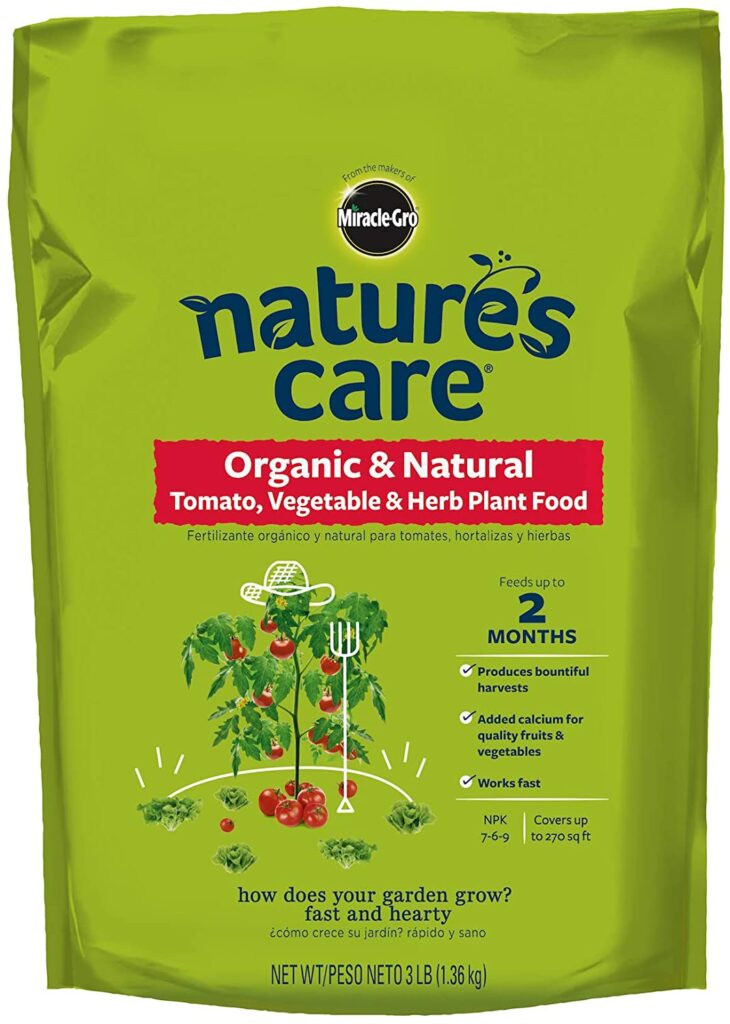
Miracle-Gro has a line of organic products that suits the needs of organic gardeners. Miracle-Gro Nature’s Care Organic & Natural Tomato, Vegetable & Herb Plant Food is a slow-release organic fertilizer that will consistently feed your plants for up to 2 months.
This fertilizer is formulated to encourage the rapid growth of plants and boost the fruit production of vegetables and fruits. It is enhanced with extra calcium content to improve the quality of your harvest. Calcium contributes the cell development in plants to ensure healthy roots, stems, and foliage.
It is a 7-6-9 NPK fertilizer and has been praised by most gardeners for its ability to help plants recover faster after transplanting. It contains extra contents such as 5% calcium, 1% magnesium, and 1.5% sulfur.
Beginner gardeners tend to have a common mistake of dissolving this fertilizer in the water. It is a slow-release fertilizer and is meant to gradually dissolve and release nutrients in the soil every time you water your plants within 8 weeks.
The only downside that conscious gardeners may notice is it doesn’t declare the exact contents of the fertilizer.
However, it does possess the typical smell of organic fertilizers that may tend to attract dogs and other animals. It is safe to use around kids and pets.
Pros
- It is an organic fertilizer.
- It is safe to use around kids and pets.
- It is environment-friendly.
- It has resealable packaging.
- It contains extra calcium and sulfur content for enhanced fruit quality.
- It contributes to the fast recovery of transplanted plants.
- It conveniently feeds your plants for up to 2 months.
Cons
- It’s a bit pricey
- It has a bad smell that can attract dogs and other animals
4. Lilly Miller Morcrop Tomato & Vegetable Food
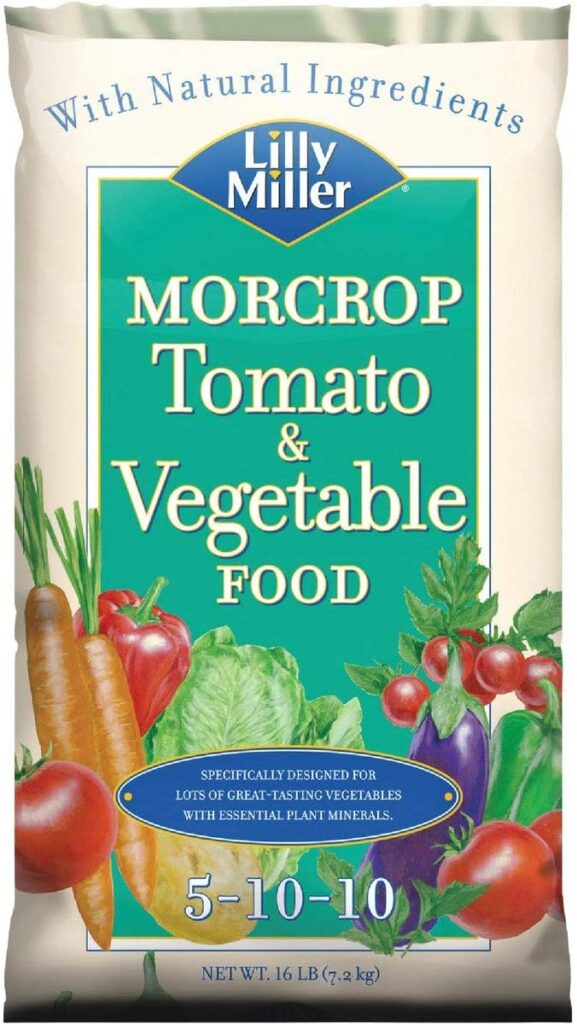
If you want to steer away from the mainstream fertilizers, it’s worth trying out small-scale fertilizer suppliers.
Lilly Miller Morcrop Tomato & Vegetable Food, though unpopular and rarely found in local stores, provides a promising impact to plant health and fruit production.
This fertilizer is one of the rare kinds that has a formulation of a 5-10-10 NPK ratio. Due to low nitrogen content, it is one of the ideal plant food for cucumbers, tomatoes, carrots, and peppers (due to their low nitrogen requirements).
The manufacturer claims that its nitrogen content is derived from 5 different sources and contains extra minerals to enhance plant growth.
It is ready-to-use, and no mixing is required. It can be used in containers and in-ground plants. This fertilizer also helps feed your plants consistently for six weeks.
All you have to do is mix it on the top layer of the soil and think about fertilizing them next month. Talk about convenience!
While it has been praised for its ability to produce immediate results in plants and for being true to its claims, it can be hard to find in local stores.
However, gardeners who discovered its potential don’t mind searching for it since it has been a lifesaver for their plants.
Another hiccup for a conscious gardener is its lack of details about its contents. Though most Lilly Miller products are organic, this particular fertilizer is not OMRI-listed.
You can always call their hotline to verify the details that you want to know about them. However, doing so can be a hassle for some gardeners.
Pros
- It is a slow-release fertilizer that feeds your plants for 6 weeks.
- It has a ready-to-use formulation with no mixing required.
- It contains extra minerals for optimal plant growth.
- It is popular for providing immediate results.
- It has a rare and promising NPK ratio of 5-10-10.
- It has a tolerable odor.
Cons
- It can be hard to find in local stores.
- It does not disclose a lot of information about its contents.
5. Miracle-Gro Performance Organics Edibles Plant Nutrition Granules
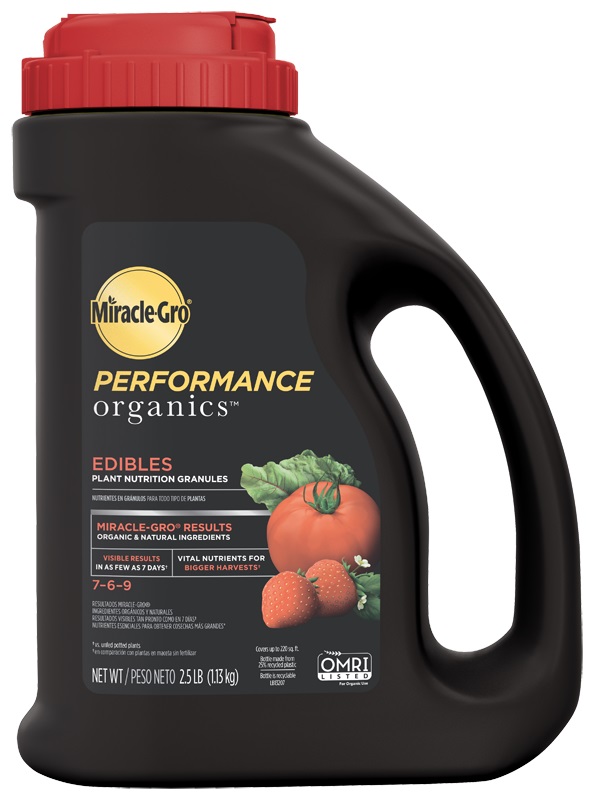
Miracle-Gro Performance Organics Edibles Plant Nutrition is another organic treat from Miracle-Gro.
It is part of their organic line of fertilizers of Miracle-Gro, along with Nature’s Care that aims to boost the production of blooms, fruits, and vegetables. The manufacturer claims to see results in your plants within seven days,
It is a slow-release fertilizer in granules form with a 9-4-12 NPK ratio. The granules can be directly mixed into the soil and leave it for the rest of the week. It is derived from the following organic materials:
- Soy protein hydrolysate
- Nitrate of soda
- Phosphate rock
- Bone meal
- Potassium chloride
- Sulfate of potash
- Copper sulfate
- Ferrous sulfate
- Manganese sulfate
- Zinc sulfate
Due to its low nitrogen content, it is best for plants with low nitrogen requirements like cucumbers and carrots.
The reason why they need less nitrogen is to divert all the plant energy in bud formation and encourage fruit production rather than growing more leaves and stems.
This fertilizer can be used for both in-ground and container plants. However, the application rate would vary since plants grown in containers will need more nutrients than those planted on the ground.
Since it is organic, it is safe to use it for both indoor and outdoor plants.
As with most organic fertilizers, this plant food has a bad odor which may prevent some gardeners from using it indoors.
There are also some concerns about its inconvenient packaging since the granules tend to pour all over the place when you try to scoop for just a teaspoon of fertilizer.
Other than the packaging and smell concerns, it is environmentally, kid and pet-friendly. It also doesn’t contain any poultry content, which is an advantage for vegan growers. Plus, it is OMRI-listed.
Pros
- It is an organic fertilizer.
- It is safe to use indoors and around kids and pets.
- The slow-release formula can ensure the consistent feeding of your plants
- No mixing is required, which makes it easier to use.
- Doesn’t burn plants
Cons
- It has the usual bad smell from organic fertilizers that can attract dogs and other animals
- Some gardeners find its packaging inconvenient since they need to pour the granules into another cup to scoop out the amount they need.
6. Tomato-Tone Organic Fertilizer
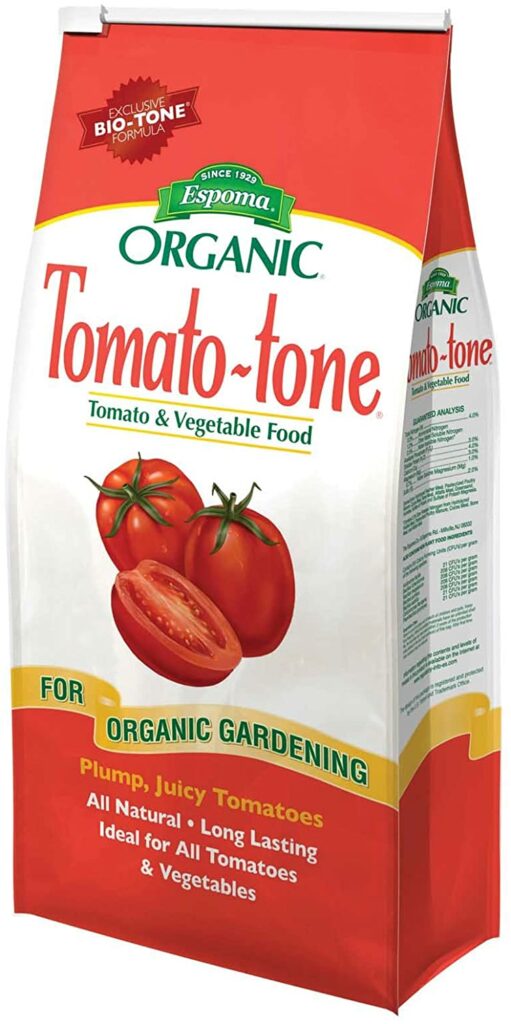
The second entry of the Espoma line of fertilizers in our list is their Tomato-Tone.
We know it’s kind of confusing why we put this tomato fertilizer on this list. It qualifies as a good fertilizer for cucumbers since tomatoes have the same nutrient requirements as cucumbers, carrots, and most herbs.
Tomato-Tone is an organic fertilizer that contains living microbes to help enhance the soil quality of your plants.
A nutrient-dense soil plays an essential role in the healthy and abundant production of fruit crops like cucumbers. It is also fortified with 15 essential nutrients for optimal plant performance.
This fertilizer is a slow-release fertilizer that feeds your plants for up to two weeks. It has a 3-4-6 NPK ratio that can be used during soil preparation and fertilization.
It is fortified with 8% calcium, 0.9% magnesium, and 1% humic acid that contributes to the production of good quality cucumbers.
It is derived from organic material materials, such as:
- Feather meal
- Poultry manure
- Bone meal
- Alfalfa meal Greensand
- Sulfate of potash
- Sulfate of potash magnesia
It is praised by gardeners for its no-mix formula and its good effect on heavy feeders like tomatoes and cucumbers. Its strong bad smell is its only drawback since it attracts dogs, cats, and other animals. So, it is essential to store this fertilizer in a place out of reach of persistent pets.
Since it is an organic fertilizer, it’s safe for the environment and safe to use around kids and pets. It also doesn’t pose any health risks, unlike other synthetic fertilizers.
Pros
- It is an organic fertilizer.
- It is safe to use around kids and pets and safe for the environment.
- The slow-release formula ensures consistent plant feeding.
- It contains extra calcium content that helps prevent plant diseases and improve fruit crop quality.
- It doesn’t contain any sludges or fillers.
Cons
- It contains poultry manure which can be a disadvantage for vegan gardeners.
- The strong smell can attract dogs and cats.
7. Miracle-Gro Tomato Plant Food
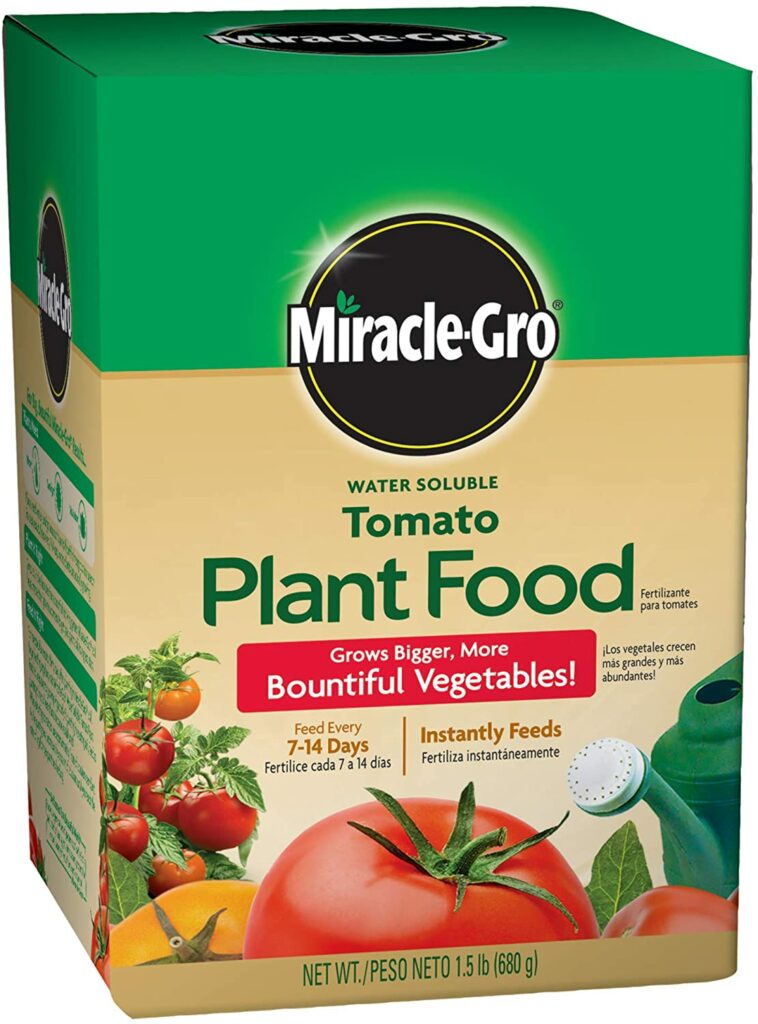
Another tomato fertilizer that works best on cucumbers is Miracle-Gro’s Tomato Plant Food. It is among the all-purpose line of fertilizers that applies to all kinds of vegetables due to its high potassium content.
Potassium is responsible for transporting water, carbohydrates, and nutrients throughout the entire plant.
This fertilizer has an 18-18-21 NPK ratio that is suitable for plants with low nitrogen requirements.
Aside from tomatoes and cucumbers, it is also the recommended plant food for growing squash, pepper, and carrots. It is formulated with:
- 0.50% Magnesium
- 0.05% Copper
- 0.10% Iron
- 0.05% Manganese
- 0.05% Zinc
The water-soluble formulation of this fertilizer helps the plant to absorb nutrients faster since the water travels faster throughout the plant. Thus, contributing to immediate results within a week or two.
It is recommended to use it with caution to prevent leaking phosphorus into the groundwater and only use what is recommended from the product label.
Since it is a synthetic fertilizer, it may not be safe to use around kids and pets.
Pros
- It contains low nitrogen content and high levels of potassium that are suitable for heavy feeders like tomatoes, cucumber, and carrots.
- It can also be used on all types of vegetables.
- It is a non-burning fertilizer.
- The water-soluble formula helps provide immediate results in plants.
- It has no odor that is usually found in most organic fertilizers.
Cons
- Synthetic fertilizer
- Not safe to use around kids and pets
8. FoxFarm Big Bloom Liquid Concentrate
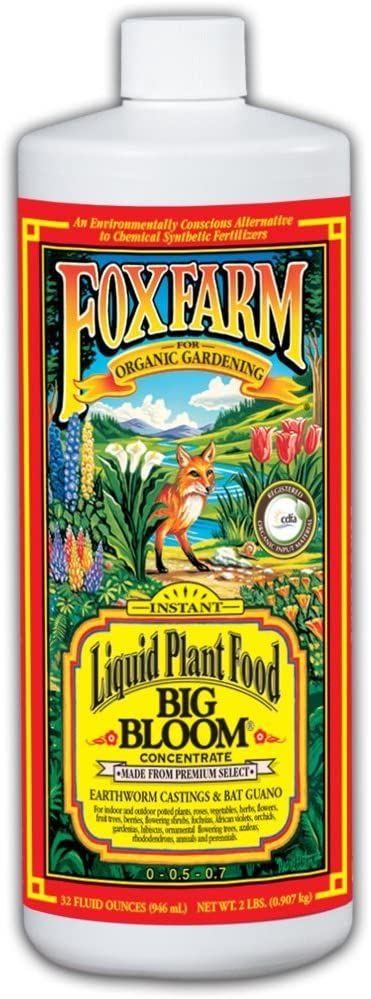
FoxFarm is one of the successful lines of fertilizers in becoming one of the big names in the fertilizer industry.
They have a different formulation that makes them stand out from the rest while delivering exceptional results in plants.
One part of their strategy is not disclosing their secret formula to everyone, even to gardeners.
FoxFarm Big Bloom Liquid Concentrate is an organic fertilizer formulated to promote big and abundant blooms in fruit crops to encourage more fruit production. It also helps improve the quality of your harvest by enhancing the flavor and fragrance of the fruits and vegetables.
It is a 0-0.5-0.7 NPK fertilizer fortified with a biologically alive formula to improve the soil condition. It is enhanced with bat guano and earthworm castings to create a nutrient-dense soil environment for your cucumbers.
Bat guano is the manure of seabirds and bats used in fertilizers due to their rich nitrogen, phosphorus, and potassium content. It is also used as a fungicide and helps control nematodes in the soil. It is also responsible for the rapid breakdown of organic matter in the soil for the faster absorption of nutrients.
Pros
- It is an organic fertilizer and OMRI-listed.
- Due to its organic nature, it is safe for the environment and safe to use around kids and pets.
- It contains bat guano and worm castings that help make it more effective in nourishing plants and boosting fruit production.
- It also has a non-burning water-soluble formula that ensures rapid absorption of nutrients in plants.
Cons
- It contains animal manure that may not be suitable for vegan gardeners.
9. Miracle-Gro Shake ‘N Feed Tomato, Fruits and Vegetables Plant Food
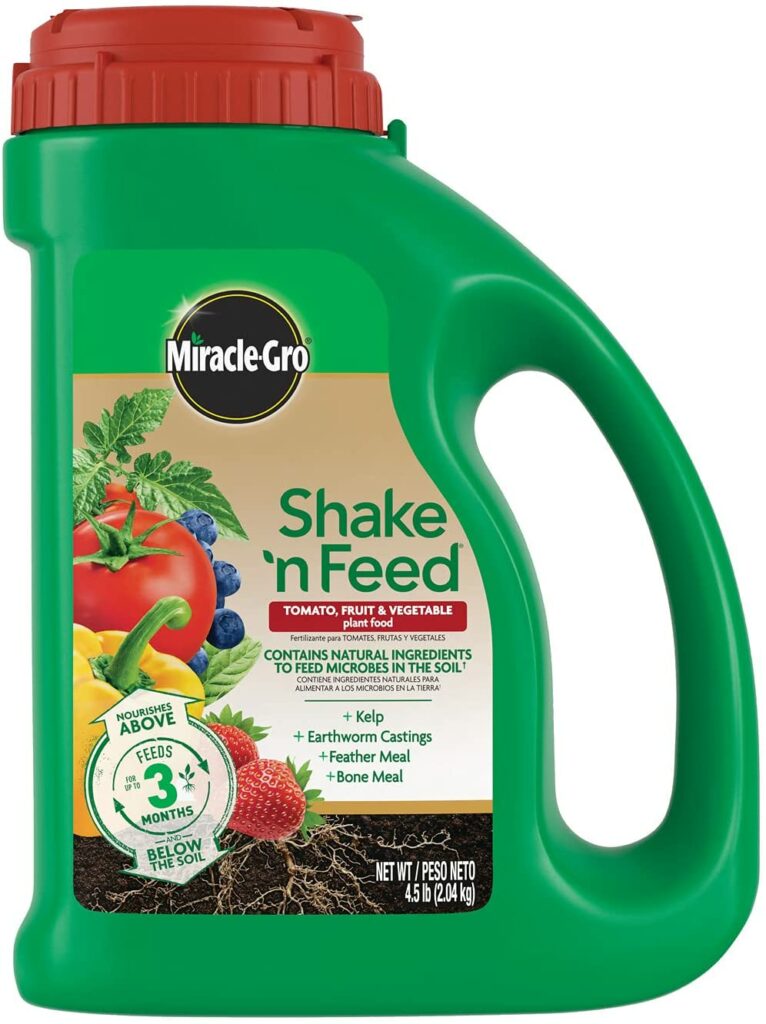
Miracle-Gro Shake ‘N Feed Tomato, Fruits and Vegetables Plant Food is one of the gardener’s favorites for its easy-to-use formula and organic contents that help plants produce bigger and better fruits. It is now one of the popular fertilizers in home gardens and became the holy grail of those who swear by its promising results.
This fertilizer is a slow-release organic fertilizer that helps consistently feed your plants for up to 3 months. It helps feed soil microbes and microorganisms with natural materials to boost the breakdown of organic matter in the soil.
It is derived from:
- Urea ammonium phosphate
- Feather meal
- Kelp meal
- Alfalfa meal
- Earthworm castings
- Copper oxide
- Iron oxide
- Manganese oxide
- Zinc oxide
- Bone meal
- Potassium sulfate
- Calcium carbonate
- Dolomite limestone
- Magnesium oxide
- Magnesium sulfate
- Copper sulfate
- Ferrous sulfate
- Manganese sulfate
- Zinc sulfate
- Polymer-coated urea
This fertilizer has a 10-5-15 NPK ratio and is fortified with the extra calcium content.
Calcium helps plants build strong cell walls and prevent signs of calcium deficiency in plants like stunted plant growth. It can be used both indoors and outdoors.
Since it is made of organic materials, it is generally safe to use around kids and pets. It also doesn’t pose risks to the environment and should be kept in a place that is out of reach of children.
Pros
- It is an organic fertilizer.
- It is safe to use indoors and around kids and pets.
- The slow-release formula can ensure the consistent feeding of your plants
- No mixing is required which makes it easier to use.
- It doesn’t burn plants.
- It has extra calcium content for better plant nourishment.
Cons
- A bit pricey
10. Jack’s Classic Tomato Feed
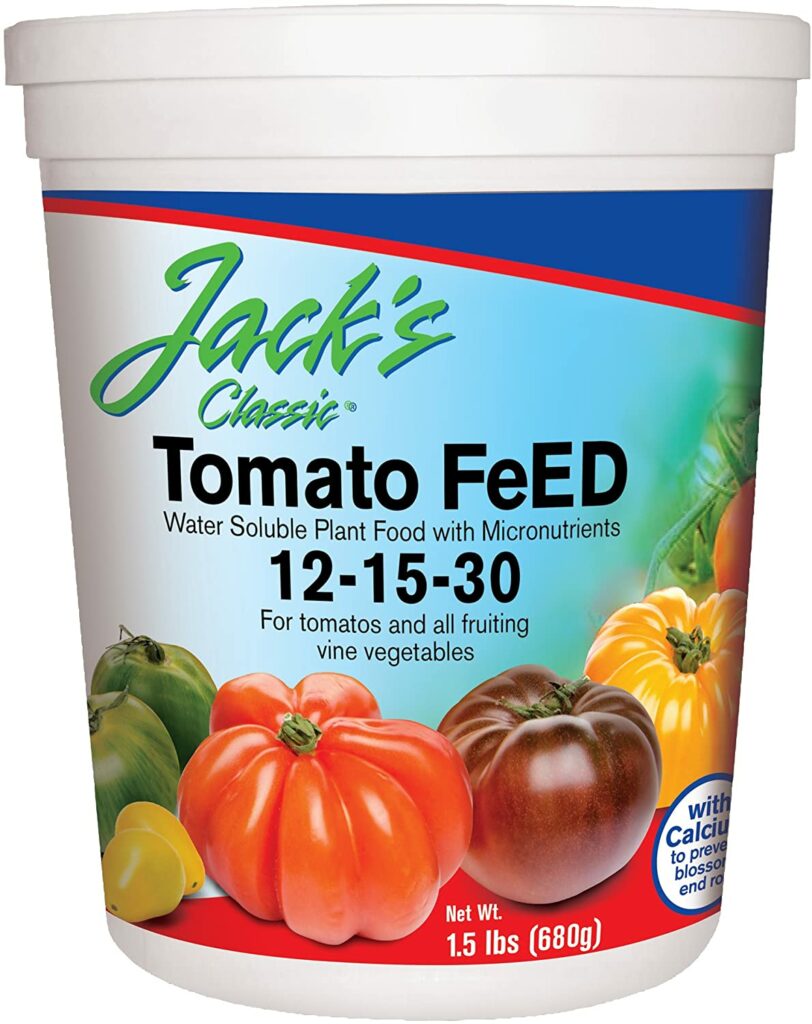
Last but not the least, it’s worth checking JR Peter’s Tomato Feed from their Jack’s Classic Collection.
If you are growing some flowering plants, you may have come across JR Peter’s line of fertilizers for flowering plants. However, they also have a set of fertilizers for vegetables that are still unknown to most gardeners.
Jack’s Classic Tomato Feed is a synthetic fertilizer with an NPK ratio of 12-15-30. It is, by far, the fertilizer with the highest potassium content which is the ideal nutrient ratio for heavy feeders like cucumber.
It is enhanced with micronutrients to feed the microbes in the soil and boost optimal plant performance.
This is a water-soluble fertilizer that makes it easier for plants to absorb nutrients and display immediate results. It is fortified with extra calcium and magnesium content to boost plant cell growth and produce the highest quality vegetables and fruits. This is the ideal plant food for:
- Tomatoes
- Peppers
- Cucumbers
- Eggplants
- Squash
- Zucchini
It’s a non-organic fertilizer and may not be safe to use around kids and pets. You should also watch out for phosphorus runoff and only mix a diluted solution based on the product label.
Pros
- Its NPK ratio is the nutrient ratio for cucumbers
- It has good packaging.
- It contains extra nutrients such as calcium, magnesium, and micronutrients.
- No odor
Cons
- Synthetic fertilizer
- Not kid and pet-friendly
You might also like: 10 Best Fungicides For Tomatoes – Reviews & Top Picks
Choosing The Right Fertilizer For Cucumbers
Cucumbers are often considered as a vegetable since it is a common ingredient in most cuisines around the globe.
However, since it has a seed, it’s considered a fruit. It grows as a vine and needs vertical support as it grows and starts to bear fruits.
Since the goal in cucumbers is to grow more fruits during the growing season, your goal is to help boost bud formation.
When a plant produces more blooms, that also means you’ll enjoy a bountiful summer.
With that said, you must choose a fertilizer that is high in phosphorus which is responsible for bud formation, and potassium for better transmission of water, and essential nutrients throughout the plant.
So choose the fertilizers with higher values at the last two numbers in the NPK ratio like 5-10-15.
As for the other factors to consider, it is always best to choose an organic fertilizer to avoid damaging the environment and take fewer health risks at home.
Slow-release fertilizers can also be more convenient to use than water-soluble ones. However, they remain at par with each other when it comes to boosting plant performance.
Final Thoughts
We hope that this post has introduced you to some of the hidden potentials of small-scale fertilizers.
While mainstream fertilizers for vegetables are effective, some unpopular brands of fertilizer work just the same but at a lower cost.
Now that we narrowed down the overwhelming selection of fertilizers in the market for cucumber, it’s now time for you to decide based on your personal preferences.
Good luck! May you enjoy a bountiful harvest of arm-length cucumbers this growing season!
If you find this post informative, please don’t forget to share it with your friends and be part of our gardening community.
You may also share your experience with the fertilizer you chose in the comment section below.
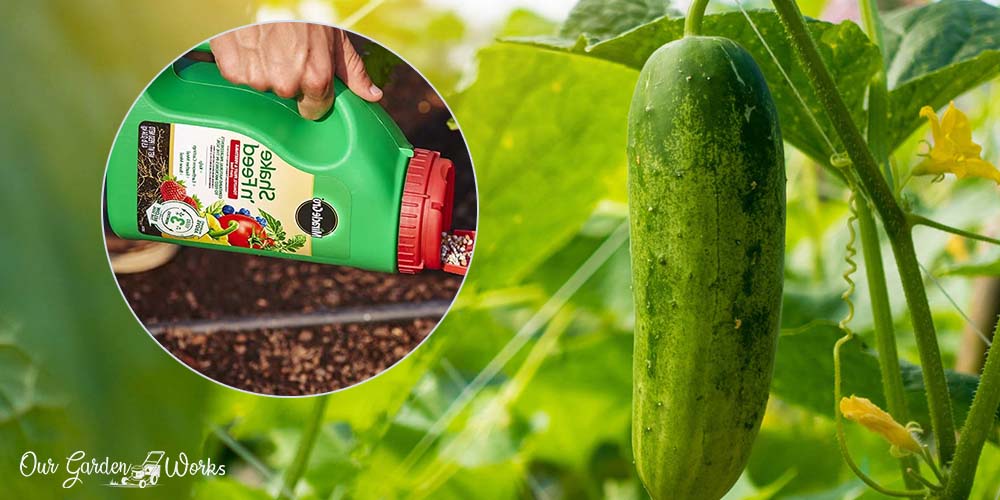
Agree 100% with the Espoma. Been using it in the vegetable garden for a long time along with my compost and mushroom soil bed mix. I’m not happy with the inflated prices of this product since the summer of 2020. Amazon is absolutely gouging on this item this year. 300% increase in 12 months.